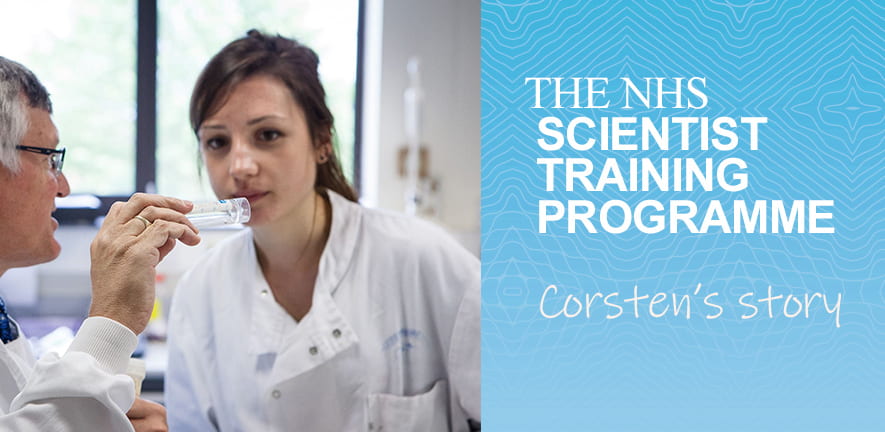A Q&A with Dr Corsten Douglas, who shares her experiences from the NHS Scientist Training Programme
Tell us a bit about yourself. What did you study and what have you been doing since you left Cambridge?
I studied for a PhD in biological sciences at the MRC mitochondrial biology unit. My thesis was ‘The assembly pathway of human ATP synthase’. Since I left the university, I started freelance private tutoring (without an agency), tutoring KS1-4 biology, chemistry and physics, A level biology and chemistry and 11+. After a year of tutoring, I started a full-time job at Cambridge Science Centre as a science communicator. I applied for the NHS Scientist Training Programme just before I got the CSC job.
How did you first hear of the NHS STP programme and what did you learn through Open Days?
I heard about the STP via a friend who was working in the NHS. I learned from going to the open day that my idea to study Ahmed’s Clinical Biochemistry – Frontiers of biomedical science textbook was the correct thing to do, and that getting some experience, even one day, in a clinical biochemistry laboratory would be advantageous.
Which specialism(s) did you apply to, and why?
I prepared for the psychometric tests by revisiting my KS3 maths revision guide that I use for tutoring. I did this because when trying the Talent-Q practice tests, it looked a lot like KS3 maths. In fact, the real test was full of even some simple KS3 maths, such as how to interpret bus timetables. For the logic tests, I printed out the Talent-Q practice tests by doing a screen print of each one, and just looking at them until I found a pattern, taking as long as I needed. I thought it would be best to make a check list of which patterns were found, and then wait a few weeks before taking the Talent-Q practice test again to make sure that I couldn’t just remember the answers and that it was just logic that I was using the answer them. This strategy was probably a good one, as I felt that I got all of the logic questions correct in the real thing.
A PhD is not an essential requirement for these roles. What did you see as the advantages/disadvantages of being a PhD graduate during the selection process?
The advantages of having a PhD were that during the general science station at the interview, I used a lot of knowledge gained during my PhD to answer the questions. I didn’t really see a disadvantage, as the introductory chapter of Nessar Ahmed’s Clinical Biochemistry mentions that clinical scientists may have a PhD in a relevant subject such as vitamin analysis. My PhD was not clinical, but is useful if I specialise in ‘in-born errors of metabolism’.
What does it mean to be ‘white-listed’?
I got a high enough interview score to be employed/accepted, but there weren’t enough spaces/my rank wasn’t high enough initially. If someone drops out, then they use your first choice hospital location to place you. I found out I was successful and got my first choice of locations on 2 August this year, nearly two months after being on the reserve list/white-listed.

